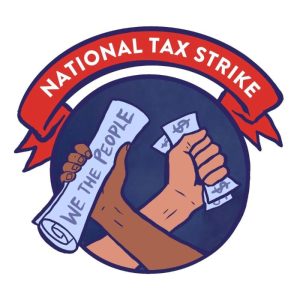By David Gross
[Editor’s Note: David Gross wrote the following article for his website after presenting on a panel about resisting taxes in the Trump era at NWTRCC’s May 2025 conference. It is reprinted here with permission. A recording of the entire session can be found below.]
Yesterday I was on a panel concerning “Resisting Taxes in the Trump Era” at the National War Tax Resistance Coordinating Committee’s spring gathering. Below is a summary of my remarks:
We can no longer reliably extrapolate from long-standing precedent about how the government operates, or how it responds to tax resisters, to anticipate the near future. While past tax policy changes have been slow, gradual, and predictable, near-future changes are likely to be abrupt, arbitrary, and unstable.
This presents us with new challenges but also new opportunities. I want to consider five areas the war tax resistance movement in the US should be aware of, observant about, and prepared for. But it’s too early to draw strong conclusions about any of them:
- Changes at the IRS
- The possible end of the federal income tax
- Expanded government information-sharing
- Anti-Trumpery tax resistance
- How to resist tariffs
Changes at the IRS
First: the IRS is being significantly degraded and is in disarray. There have been four acting IRS commissioners already in the first four months of the Trump administration, serving between four days and six-and-a-half weeks each. There is no Senate-confirmed commissioner. In addition there have been thousands of dismissals of probationary IRS employees, and many others have accepted buyout offers to retire early. Furthermore, the recently-released presidential budget assumes a further 25–50% headcount reduction at the agency. The enforcement & collection branches have not been spared from this slaughter.
The agency was already on-the-ropes before all this happened. For years they have lost headcount and their budget has dwindled, even as their responsibilities and the number of taxpayers has increased. There was briefly some hiring and a budget boost at the agency during Biden’s term, but that hardly had begun to take effect before Trump’s crew came in and eviscerated it.
As a result, we can predict that the already feeble agency will be further incapacitated.
Second: there has been a collapse of the post-Nixon consensus that put a firewall between IRS enforcement and political appointees. For the last 50 years it would have been considered a serious taboo for the president or one of his political appointees to try to go to the IRS and say “you should audit so-and-so; I think they’re up to something (or: I don’t like them).” IRS enforcement decisions were firmly in the hands of career IRS employees, not political appointees. Trump is putting an end to that. He’s put a political appointee in charge of the IRS Criminal Investigation Division. He’s being aggressive in using his powers to punish political enemies or to shake down deep-pocketed victims. We can expect that he will use the IRS in this way, too.
Will this affect American war tax resisters? Probably not right away. I don’t think we’re on Trump’s enemies radar, and we’re not attractive shakedown targets. But if tax resistance becomes a more prominent part of the anti-Trumpery movement, then, yes: expect politically-motivated reprisals.
The possible end of the federal income tax
 Trump has repeatedly claimed that he plans to replace the IRS with an “External” Revenue Service, and replace income taxes with tariffs. Of course, Trump claims a lot of things, and that’s never been a good reason to take those claims seriously. But there are some other lines of evidence that suggest this may be for real.
Trump has repeatedly claimed that he plans to replace the IRS with an “External” Revenue Service, and replace income taxes with tariffs. Of course, Trump claims a lot of things, and that’s never been a good reason to take those claims seriously. But there are some other lines of evidence that suggest this may be for real.
Trump’s nominee for IRS Commissioner, Billy Long, when he was in Congress, co-sponsored legislation to abolish the IRS and replace the federal income tax with a sales tax. This idea of replacing income taxes with consumption taxes has been floating around conservative circles for decades, but hasn’t had enough traction to go anywhere, yet. The “serious people” mostly ignore these proposals as being too onerous to accomplish and too likely to go very badly, but Trump shows strong signs of being willing to do very disruptive things and to not care much if they’ll go badly, so I think we have to consider the possibility.
This is not something Trump could do directly by fiat. Congress would have to act to eliminate the federal income tax or the Internal Revenue Service. But potentially Trump could force their hand by (1) unilaterally enacting tariffs, as he can do and has done, and (2) making the IRS so dysfunctional that it can no longer effectively collect income taxes, as he seems to be doing. At that point, Congress might be faced with a fait accompli and might believe that if it wants to continue to have a budget to spend, it must allow Trump to raise tariffs (or other consumption taxes) to make up for what the IRS is unable to collect.
This is probably not happening right away. The current Trump budget and tax proposals are for income tax cuts and for cuts to the IRS but not elimination of either.
Where would this leave war tax resisters, who tend to concentrate on the federal income tax as the most important source of war funding? We would have to retool to resist these new taxes in new ways. (More on this below.)
Expanded information-sharing among federal agencies
A variety of legal firewalls, bureaucratic hurdles, and incompatibilities have prevented federal government agencies from sharing information with each other. Some of that fell away during the consolidation of the Department of Homeland Security after 9/11. Now many of the remaining firewalls seem to be dropping to DOGE.
Most news I’ve seen about this is in the immigrant-crackdown context. For example, the IRS is sharing info from people’s tax returns, and the postal service is sharing information about people’s mailing addresses, to help ICE find immigrants to deport.
Potentially this could make it easier for the IRS to find assets or previously shadowy income. There’s no sign that this is happening yet, and it would be yet another task for a gutted IRS to try to tackle, so maybe it’s unlikely, but it’s worth keeping on the radar, and we should raise the alarm if anyone notices anything.
Anti-Trumpery tax resistance and war tax resistance
 There’s a lot of eagerness among anti-Trumpery activists for some strong, collective action, which could include tax resistance (see for example the National Tax Strike under the Choose Democracy umbrella).
There’s a lot of eagerness among anti-Trumpery activists for some strong, collective action, which could include tax resistance (see for example the National Tax Strike under the Choose Democracy umbrella).
Where does the war tax resistance movement fit in? Anti-Trumpery tax resistance isn’t “war” tax resistance. Sure, you can stretch “war” metaphorically to cover deportations, civil liberties collapse, evasion of due process, Constitutional crisis, willful malgovernance, fascism, white supremacy, and so forth, but it’s awkward. Most of NWTRCC’s outreach and educational material assumes that war and militarism are the focal concern of tax resisters, and to these new resisters this has the potential to be alienating at worst or confusing at best.
Of course, if Trump invades Greenland or Canada or something, then the anti-Trumpery movement will probably develop a strong anti-war focus, and then war tax resistance rhetoric will fit right in. I suppose we can’t rule that out.
It’s an encouraging sign that the War Tax Resisters Penalty Fund mutual aid program now explicitly welcomes anti-Trumpery tax resisters as well as traditional war tax resisters. Maybe we can learn from the process they went through as they decided to become more accommodating to a new set of resisters.
How to resist tariffs

David Gross at the rally in San Luis Obispo, CA, Jan. 2017. Photo by Dan Gross.
Trump would seemingly prefer that tariffs permanently make up a predominate portion of federal government income (and therefore military budget income), as they did in the 19th century. How could war tax resisters continue to resist if this were to come to pass?
Tariffs are taxes that apply to imported goods and that are paid by the US importer. So you can resist to some extent simply by not importing anything so that you personally do not pay the tax. But the typical American is going to be paying tariffs indirectly as a consumer of goods whose prices include the costs of tariffs to the importer or manufacturer.
Note that tariffs apply not only to consumer-ready goods (like imported cars) but also to imported raw materials and intermediate manufacturing goods. For this reason, the prices of many “domestic” products will embed tariffs just as much as do imported ones. A tax resistance strategy of consuming only “Made in the U.S.A.” domestic goods will not be effective.
Some tactics that might be worth considering if tariffs make up a large amount of military income include:
- Anti-consumerism, lifestyle simplification, DIY, grow-your-own, repair/reuse/recycle: spend less money in general, take more of your life out of the marketplace, and you’ll spend less on tariffs.
- Smuggling: if tariffs are high, smuggling will become highly profitable and will certainly emerge. We can help nourish that and can redirect our own consumption to smuggled goods.
- Domestic manufacture: try to produce and market goods that deliberately and carefully avoid tariffs. Spread awareness about tariff-free goods.
- Promote avoidance strategies: there will certainly be loopholes that can be exploited to reduce or eliminate tariffs; we can help importers learn about and use them.
- Disrupt the tariff-collection bureaucracy: anything we can do to make the tax collectors’ work more difficult and less efficient will give the Pentagon less to play with.
These tactics (or similar ones) apply also to other consumption taxes that might be in the cards (e.g. a sales tax or use tax).

This is terrific, and we’re all in Dave’s debt. That’s the first thing to say. As for the second – well, though I’m a timid person, and a timid person just multiply levied, and who didn’t like that experience at all, I keep wondering about a different way of thinking about all this, which is to focus on the question, What is the thing those who are opposed to war (or any of Trump’s repellent priorities) due to maximize public resistance? To resist, that it, but also to have it known that we’re resisting? I presume there’d be some risk to aiming at that, as Dave suggests. But for me at any rate, that’s the central question.
Unless you’re a farmer with access to a cobbler and smith, and you spin your own yarn, weave your own cloth, sew and knit your own clothing, buying nothing to avoid tariffs or sales tax would be difficult. Since electronics we now depend upon are made to be superseded by the next model, with older models no longer supported, we would all have to learn to live like the Pensylvania Dutch.
Great info, David. Thank you.
Thanks, David, for the great info. Also, fantastic workshop on the part of all participants!